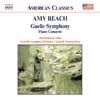Beach Piano concerto; Symphony No 2
One of the most valuable releases yet in Naxos’s American Classics series
View record and artist detailsRecord and Artist Details
Composer or Director: Amy Marcy (Cheney) Beach
Genre:
Orchestral
Label: Naxos
Magazine Review Date: 6/2003
Media Format: CD or Download
Media Runtime: 79
Mastering:
Stereo
DDD
Catalogue Number: 8 559139

Tracks:
| Composition | Artist Credit |
|---|---|
| Concerto for Piano and Orchestra |
Amy Marcy (Cheney) Beach, Composer
Alan Feinberg, Piano Amy Marcy (Cheney) Beach, Composer Kenneth Schermerhorn, Conductor Nashville Symphony Orchestra |
| Symphony, 'Gaelic' |
Amy Marcy (Cheney) Beach, Composer
Alan Feinberg, Piano Amy Marcy (Cheney) Beach, Composer Kenneth Schermerhorn, Conductor Nashville Symphony Orchestra |
Author: Andrew Achenbach
Composed in 1898-99, Amy Beach’s ambitious, singularly impressive Piano Concerto is at long last coming in from the cold. An expansively rhetorical Allegro moderato launches the work before a playful perpetuum mobile scherzo and moody Largo (described by its creator as a ‘dark, tragic lament’); the finale (which follows without a break) goes with a delightful swing. In fact, it’s a rewarding achievement all round, full of brilliantly idiomatic solo writing (Beach was a virtuoso pianist herself and performedthe work many times) and lent furtherautobiographical intrigue by its assimilation ofthematic material from three early songs.
Much as I appreciate the gentle perception of Joanne Polk’s 1999 account with Paul Goodwin and the ECO, Alan Feinberg brings extra charisma to bear without any loss ofdelicacy or poetry, and his collaboration with Kenneth Schermerhorn and the Nashville Symphony undoubtedly generates greater thrust and spontaneity. The recording, too, is more pleasingly spacious, if a little lacking in body (I prefer the meatier piano timbre on the Arabesque disc).
Following the success of her 1889 Mass in E flat, Beach knew that she needed to produce a large-scale symphony to cement her reputation; it was the Boston première of Dvorák’s New World that finally spurred her into action. Responding to the Czech master’s exhortation that American composers should turn tospirituals, plantation songs and minstrel-show music for inspiration, Beach observed in a letter to the Boston Herald: ‘We of the North should be far more likely to be influenced by theold English, Scotch or Irish songs, inherited with our literature from our ancestors.’ Forher Op 32 Symphony, Beach selected fourIrish melodies of ‘simple, rugged and unpretentious beauty’, moulding any additional themes ‘in the same idiom and spirit’.
That the Gaelic Symphony (1894-96) won golden opinions from the outset comes as no surprise, given its big heart, irresistible charm and confident progress. Happily, Schermerhorn and his eager Nashville band more than hold their own by the side of Neeme Järvi and the Detroit SO. Theirs is a convincingly paced, tidy performance with real fire in its belly and plenty of character. The sound is truthfully balanced and eminently vivid, if not as opulent as Chandos’s 1991 production.
So, a thoroughly enjoyable issue, whose claims are strengthened by a lucid booklet-essay from Beach scholar Adrienne Fried Block.
Much as I appreciate the gentle perception of Joanne Polk’s 1999 account with Paul Goodwin and the ECO, Alan Feinberg brings extra charisma to bear without any loss ofdelicacy or poetry, and his collaboration with Kenneth Schermerhorn and the Nashville Symphony undoubtedly generates greater thrust and spontaneity. The recording, too, is more pleasingly spacious, if a little lacking in body (I prefer the meatier piano timbre on the Arabesque disc).
Following the success of her 1889 Mass in E flat, Beach knew that she needed to produce a large-scale symphony to cement her reputation; it was the Boston première of Dvorák’s New World that finally spurred her into action. Responding to the Czech master’s exhortation that American composers should turn tospirituals, plantation songs and minstrel-show music for inspiration, Beach observed in a letter to the Boston Herald: ‘We of the North should be far more likely to be influenced by theold English, Scotch or Irish songs, inherited with our literature from our ancestors.’ Forher Op 32 Symphony, Beach selected fourIrish melodies of ‘simple, rugged and unpretentious beauty’, moulding any additional themes ‘in the same idiom and spirit’.
That the Gaelic Symphony (1894-96) won golden opinions from the outset comes as no surprise, given its big heart, irresistible charm and confident progress. Happily, Schermerhorn and his eager Nashville band more than hold their own by the side of Neeme Järvi and the Detroit SO. Theirs is a convincingly paced, tidy performance with real fire in its belly and plenty of character. The sound is truthfully balanced and eminently vivid, if not as opulent as Chandos’s 1991 production.
So, a thoroughly enjoyable issue, whose claims are strengthened by a lucid booklet-essay from Beach scholar Adrienne Fried Block.
Explore the world’s largest classical music catalogue on Apple Music Classical.
Included with an Apple Music subscription. Download now.

Gramophone Digital Club
- Digital Edition
- Digital Archive
- Reviews Database
- Events & Offers
From £9.20 / month
Subscribe
Gramophone Club
- Print Edition
- Digital Edition
- Digital Archive
- Reviews Database
- Events & Offers
From £11.45 / month
Subscribe
If you are a library, university or other organisation that would be interested in an institutional subscription to Gramophone please click here for further information.






